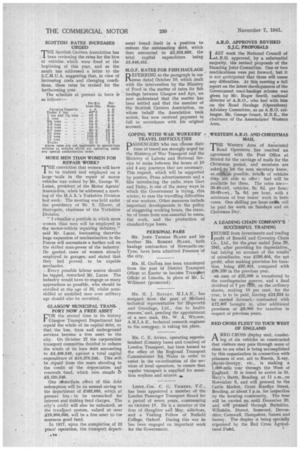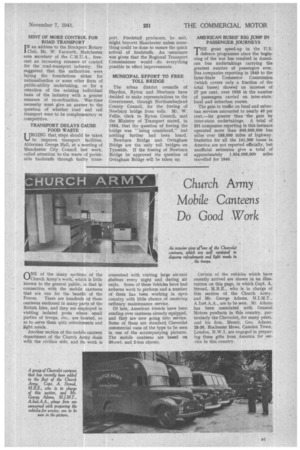SCOTTISH RATES INCREASES URGED
Page 18

Page 19

If you've noticed an error in this article please click here to report it so we can fix it.
THE Scottish Carriers Association has I been £e-viewing the rates for the hire of vehicles which werefixed at the beginning of this year, and as the result has addressed a letter to the S.C.M.U.A. suggesting, that, in view of increasing costs and changing conditions, .these rates be revised for the forthcoming year.
The schedule at present in force is as follows:— MORE MEN THAN WOMEN FOR REPAIR WORK?
THE conviction that women will have to be trained and employed on a large cale in the repair of motor vehicles was voiced by Mr.. George W. Lucas,. president of the Motor Agents' Association, when he addressed a meeting of the M.A.A.'s Yorkshire Division last week. The meeting was held under the presidency of Mr. S. Glover, of Harrogate, chairman of the Yorkshire Division.
'I visualize a persitidt in which more women than men will beemployed in the motor-vehiclerepairing industry," said Mr. Lucas, forecasting thatothe huge expansion of mechanization in the Forces will necessitate a further call on the skilled man-power of the industry. He quoted. cases of women already employed in garages, • and stated that they had proved to be capable mechanics.
• Every possible labour source should
be. tapped, remarked Mr. Lucas. The industry would have to engage as many apprentices as possible, who should be enrolled at the age of 16, whilst semiskilled or unskilled men over _military age should also he recruited.
GLASGOW MUNICIPAL TRANSPORT NOW A FREE ASSET FOR the second time in its history Glasgow Transport Department has repaid the whole of its capital debt, so that the bus, tram and underground services become a free asset to the city. On October 27 the corporation transport committee decided to redeem the whole of its loam debt amounting to £4,408,540, against a total capital expenditure of £10,379,245. This will be repaid from the sums standing to the credit of the depreciation and renewals fund, which now stauds £5,120,246.
One immediate effect of this debt redemption will be an annual saving to the department of £133,000, which at present has • to be earmarked for interest and sinking fund charges. The city's credit will also be enhanced, as the trang'port system, valued at over gict,000,ogo, will be a free asset to Ins common good fund.
In 1917, upon the completion of 23 years' operation, the transport depart . sill
ment found itself in a position to redeem the outstanding debt, which then amounted to £2,328,889, the total capital expenditure being £5,846,455.
M.O.F. RATES FOR FISH HAULAGE
R'
.RRING to the paragraph in our issue dated October 10, which dealt with the intervention by the Ministry of Food in the matter of rates for fish haulage between Glasgow and Ayr, we now understand that the matter has been settled and that the member of the Scottish Carriers Association, on -whose behalf the Association took action, has now received payment in full in accordance with his original account.
COPING WITH WAR WORKERS'. TRAVEL DIFFICULTIES
PASSENGERS who can cfloose their time of travel are strongly urged by the Ministry. of War Transport and the 'Ministry of Labour and National Service td make between the hours of 10 and 4 any journeys that are necessary. This request, which will be supported by posters, Press advertisements and a film introducing the radio stars Gert and Daisy, is one of the many ways inwhich the Government is trying, this winter, to ease the travelling difficulties of war workers. Other measures include important developments in the policy of staggering working hours, the transfer of buses from non-essential to essential work, and the production of standard-type buses.
PERSONAL PARS
MR. JOHN THOMAS BLAKE and his brother MR. ROBERT BLAKE, both haulage contractors of Newcastle-onTyne, have been admitted Freemen of the city.
MR. H. COtTEa has been transferred from the post of District Transport Officer at Exeter to become Transillert Officer at Lincoln, in place of Mr. L. Willment (promoted).
Me. H. 3. lanytriv, M.I.A.E., has resigned from the post of Midland technical representative for Hepworth and Granclage, Ltd., due to health reasons,' and, pending the appointment of a new man, MR.. W. A. WILSON, A.M.I.A.E., technical research engineer to the comppy, is taking his place.
MR. C. E. A.YREE, operating superintendent (Country buses and coaches) of London Transport, has been loaned to the office of the Regional Transport Commissioner for Wales in order to assist in the co-ordination of the services of local operators, to ensure that regular transport is supplied for munition workers and miners. 0,
LrettraCoe. C. G. Vicicens, V.C., has been appointed a member of the London Passenger Transport Board for a period of seven years, commencing on October 17. 14e is a member of the firm of Slaughter ana May, sOlicitors. and a Visiting Fellow of Nuffield College, Oxford. During this war he has been engaged on important work for the Government. A.R.O. APPROVES REVISED S.J.C. PROPOSALS
LAST week the National Council of LAA.R.O. approved, by a substantial majority, the revised proposals of the Standing Joint Committee. One or two modifications were put forward, but it is not anticipated that these will cause any difficulties. At this meeting a full report on the latest developments of the Government road-haulage scheme was given by Mr. Roger S'ewill, national director of A.R.O., who had with him on the Road Haulage (Operations) Advisory Committee, as an A.R.O. colleague, Mr. George Smart, MBE., the chairman of the Associations' Western Area.
WESTERN A.R.O. AND-CHRISTMAS
THE Western Area of Associated Road Operators has reached an agreement with the Post Office at Bristol for the carriage of mails for the Christmas period, and members are asked to let the area secretary know, so soeltats possible, detale of vehicles they are able to offer; fuel will be available for these. The rates are :— 30-40-zirt, vehicles, Os. 6d. per hour; 50-60-cwt., 7e. 6d. per hour, with minimum of four hours' work in both cases. One shilling per hour exits. will be paid for work on Sundays and on Christmas Day.
A LEADING CHAIN COMPANY'S ' SUCCESSFUL TRADING
INCOME from investments and trading profit of Renold and Coventry Chain Co., Ltd., for the year ended June 29, 1941, after providing for depreciation, but taking no account of the results' of subsidiaries, was £196,404, the net profit, after making provision for taxation, being £93,404, compared with £99,330 in the previous year.
IA sum of £25,000 is transferred to the contingencies reserve, and a final dividend of 7 per ftt. on the ordinary shares, making 10 per cent, for the year, is to be paid, leaving £24,924 to be carried forward,contrasted with £12,407 brought in, after additional provision of 29,000 for taxation in respect of previous years.
RED CROSS FLEET TO TOUR WEST OF ENGLAND
A RED CROSS display unit, consist1-1 ing of six vehicles so constructed that visitors may pass through some of them to see what is being accomplished by this organization in connection with prisoners of war, aid to Russia, X-ray, physio-therapy, etc., is making a 1,000-mile tour through the West of England. It is timed to arrive in St. Mary's Butts, Reading, at 11 a.m., on November 8, and will proceed to the Cattle Market, Great Knollys Street. Reading, at about 1 p.m. for inspection by the farming community. The tour will be carried on until December 20, and will proceed through Berkshire,. Wiltshire, Dorset, Somerset, Devonshire, Cornwall, Hampshire, Sussex and Surrey. The display is being specially organized by the Red Cross Agriculturat.Futlid.
HINT OF MORE CONTROL FOR . ROAD TRANSPORT
IN an address to the Stockport Rotary Club, Mr. W. Fat-north, Manchester area secretary of the C.M.U.A., forecast an increasing measure of control for the road-transport industry. He suggested that the authorities were laying the foundations either for nationalization or some other form of public-utility undertaking, or for a retention of the existing individual basis of the industry with z. greater measure of co-ordination. War-time necessity must give an answer to the question of whether road and rail transport were to be complementary or competitive.
TRANSPORT DELAYS CAUSE FOOD WASTE
URG1NG that, steps should be taken to improve transport facilities, Alderman George Hall, at a meeting of Manchester City Council last week, called attention to.the waste of perishable foodstuffs through faulty trans port. Foodstuff producers, he said, might boycott Manchester unless something could be done to ensure the quick arrival of foodstuffs. An -assurance was given that the Regional Transport Commissioner would do everything possible to effect improvements,
MUNICIPAL 'EFFORT TO FREE TOLL BRIDGE The urban district councils of Blaydon, Ryton and .Ntwburn have decided to make representations to the Government, through Northumberland County Council, for the freeing of Newham bridge from tolls. Mr. W. Fellis, clerk to Ryton Council, said the Ministry of Transport stated, in 1934, that the question of freeing the bridge was " being considered," but nothing further had been heard.
Newburn Bridge and Ovingham Bridge are the only toll bridges, on Tyneside. If the freeing of Newb urn Bridge be approved the question of Ovingham Bridge will be taken up. AMERICAN BUSES' BIG JUMP IN PASSENGER JOURNEYS
T"great speed-up in the U.S. defence programme since the beginning of the war has resulted in American bus undertakings carrying the greatest number of passengers ever. Bus companies reporting in 1940 to the Inter-State Commerce Commission (which covers only a fraction of the total buses) showed an increase of 27 per cent. over 1939 in the number of passengers carried on inter-state, local and suburban routes.
The gain in traffic on local and suburban services amounted to nearly 40 per cent —far greater than the gain by inter-state undertakings. A total of 201 companies reporting in this instance operated more than 800,000,000 bus miles over 188,000 miles of highway. Statistics for all the 141,300 buses in America are not reported officially, but unofficial estimates give a total of approximately 1,954,000,000 miles travelled for 1940.




















































